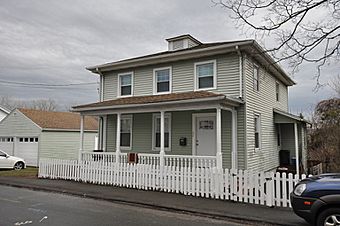Canoe Brook Historic District facts for kids
Quick facts for kids |
|
|
Canoe Brook Historic District
|
|
 |
|
| Location | Roughly along Bradley St., Cherry Hill Rd., Home Place, Lincoln Ave., Main and N. Harbor Sts., Branford, Connecticut |
|---|---|
| Area | 52 acres (21 ha) |
| Architectural style | Colonial, Federal, et al. |
| NRHP reference No. | 02000335 |
| Added to NRHP | April 11, 2002 |
The Canoe Brook Historic District is a special neighborhood in Branford, Connecticut. It's a historic area with homes that show over 200 years of building styles. This district is west of Branford's town center. It stretches from Cherry Hill Road to Bradley Street, and includes parts of Main Street and other roads. In 2002, it was added to the National Register of Historic Places. This means it's an important place to protect! The area gets its name from Canoe Brook, a small stream. This stream is now mostly covered by roads and buildings.
Exploring the Canoe Brook Historic District
The Canoe Brook Historic District covers about 52 acres (21 hectares). It has 51 historic houses. You can also find a few shops, community buildings, and two schools here. There's even a fire station! Most of the buildings are made of wood. They show many different styles. You can see very old colonial homes. There are also homes from the early 1900s. These include beautiful Tudor Revival houses.
Early History of Canoe Brook
The Canoe Brook area was first settled in the 1680s. An English settler named Daniel Swaine made his home here. His land later went to Nathaniel Harrison. The original Swaine House is no longer standing. However, two very old houses still exist. They were built in the 1720s for Nathaniel's sons. These are the Harrison House Museum and the Thomas Harrison House. They are the oldest buildings in the district.
How the Area Grew
At first, Canoe Brook was a small farming community. The Swaine and Harrison families were important here. But sailors also built homes along Main Street. The area became more populated during the Industrial Revolution. This was a time when many factories were built. The railroad also came through, forming the southern edge of the district. Over time, more people moved in. New houses were built up until World War II. This is how the district became the busy neighborhood it is today.



